FIFA, AFC Issue Warning To Iran Regarding Women's Attendance
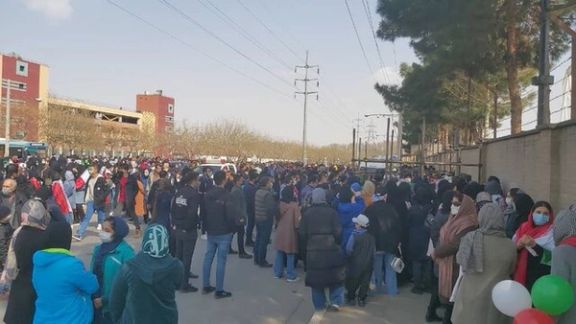
FIFA and the Asian Football Confederation issued warnings regarding Iran's ban on women's attendance at football stadiums, issuing consequences for non-compliance.

FIFA and the Asian Football Confederation issued warnings regarding Iran's ban on women's attendance at football stadiums, issuing consequences for non-compliance.
FIFA has been engaged in persistent efforts for nearly a decade to persuade Iranian authorities to rescind the unwritten restriction and enable women to witness male players' matches.
While some limited exceptions were made in recent years, the ban was reintroduced in March 2022, despite FIFA's insistence on unrestricted access for women.
Coming at a time when the world has their eyes on the women's world cup championships, the latest warnings have prompted swift action from Iranian sports authorities, resulting not only in granting permission for women to attend matches at the Azadi Stadium in Tehran but also facilitating access for women to stadiums across the country for football matches, according to Shargh daily.
The regime has, on occasion, allowed a token number of women to attend matches, seemingly as a symbolic gesture to demonstrate compliance with FIFA's recommendations, but it is a policy which has been in place for over four decades.
The Islamic Republic has for decades enforced a policy barring women from entering football stadiums, purportedly citing concerns about the suitability of the atmosphere due to profane language from male fans. This discriminatory measure has led to numerous instances of arrests, beatings, detentions, and abuses against women who have challenged the prohibition.

The giant German engineering firm Bosch reportedly aided Iran’s security forces in facial recognition technology in 2017 and delivered thousands of street cameras.
The German television outlet ARD on Sunday aired a blockbuster report titled “Iran: Persecution with modern surveillance technology,” citing a document obtained by the outlet in Persian showing that at “Khatam University in Tehran in 2017, an instruction course was organized by Bosch security and an Iranian distribution partner.” The topics of the instruction course were “facial recognition, face detection, and intelligent tracking from objects.”
The instruction teacher was allegedly a distribution director for the Bosch’s Middle East division. ARD did not name the director. Iran International sent press queries to Bosch, including the spokesperson responsible for the Middle East.
Bosch told ARD it delivered 8,000 cameras to Iran’s regime between 2016-2018. Bosch disputed that its cameras can be used for full facial recognition and denied that a Bosch employee participated in the instruction course. According to Amnesty International, the regime is expanding its” mass surveillance” targeting street traffic, with a focus on women to ensure they are wearing their compulsory hijab.
Iranian dissidents, whose images were altered to protect their identities, told ARD they seek to sabotage the cameras on the streets to prevent the persecution of protesters. ARD showed images of Bosch cameras and software used to monitor streets and highways.
An Iranian activist told ARD when a camera captures more than5 or 10 people at a protest an alarm signal is sent to the police and “within minutes” security forces are present.
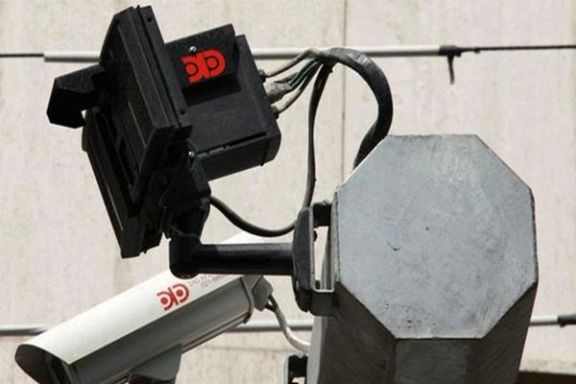
In April, Iran International reported that Ahmad-Reza Radan, the chief commander of the Iran’s police, said that his security apparatus will use advanced technology and equipment to identify women who violate the law requiring females to wear the mandatory hijab in public places. He said women and girls who do not cover their hair in “public places, cars, or commercial centers,” will be prosecuted.
The ARD concluded its report with the narrator stating “When women in Iran face a trial in the future it could take place with help of technology from Made in Germany.”
It is not clear if Bosch has had any dealings with Iran since the United States re-imposed sanctions on the Islamic Republic in 2018, but Tehran is adept at finding intermediary's to do business with Western companies.
The Iranian-American human rights activist, Lawdan Bazargan, told Iran International “Regrettably, Germany has a long-standing history of supporting the Islamic Regime of Iran (IRI) at the expense of the Iranian people, human rights, and democratic values. The 1980s, known as the Bloody Decade among Iranians, witnessed Germany maintaining close ties with Iran while remaining silent after the 1988 massacre of political prisoners. “
She said “Taking into account Germany's past experiences and the potential consequences of aiding the IRI in oppressing its people, it appears that Germany's assistance to the IRI is indeed deliberate.”
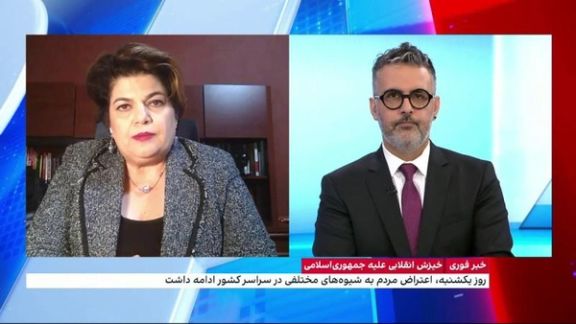
Bazargan, who runs the NGO Alliance Against Islamic Regime of Iran Apologists (AAIRIA), added, “In the mid-2000s Nokia Siemens Network (NSN) went a step further, selling an electronic monitoring and surveillance center to Iran's state-owned telephone company, bolstering this oppressive regime. The system allowed the Iranian government to easily spy on and intercept communications of dissidents heavily reliant on web-based platforms to connect with the outside world. Tragically, the IRI exploited this technology to apprehend protesters during the 2009 Green Movement, subjecting them to horrifying torture and unjust imprisonment based on their chats and text messages.”
Jason Brodsky, policy director for the US-based United Against Nuclear Iran (UANI), told Iran International that the ADR report “is deeply disturbing. It demonstrates the long standing ties between the German business community and the Islamic Republic. And underscores the need for enhanced due diligence of German companies world-wide. Iranian drones are being found with western components.
Brodsky continued “And if Bosch is, wittingly or unwittingly, involved in facial recognition and surveillance technology, then this calls for a robust investigation by Bosch and the German authorities as to what has been done here. Bosch has been a partner in the past with the Islamic Republic.” He added the “German government like to say it is committed to upholding human rights, but German businesses are involved in Iranian markets. The German government has to speak with one voice with the business community. “

Brodsky said that “Bosch was part of a German business delegation visiting Iran in 2016 after the JCPOA. The German government has to be cognizant of it that Iran extracts western technology to advance its repression apparatus at home.”
The JCPOA is an abbreviation for the Joint Comprehensive Plan of Action—the formal name of the Iran nuclear deal reached in 2015.
The Bosch corporation played a key industrial role in advancing the war aims of Nazi Germany. Bosch used an estimated 20,000 slaves, which included 1,200 concentration camp inmates, as part of its efforts to help Hitler win the war.
Rabbi Abraham Cooper, the associate dean of the LA-based Simon Wiesenthal Center (named after the legendary Nazi hunter Simon Wiesenthal), told Iran International that “Facial recognition is weaponized by the Iranian regime against women and girls and facial recognition is being facilitated by one of Germany’s legacy companies. Shame on them. And shame on the German government for not putting an end to it. The German government can put an end to it in one second by barring export licenses. “
Cooper asked “Where are the voices of the political parties and NGOs who speak up, first and foremost, for the rights of women?” He warned that the Bosch technology will damage the “Women, Life, Freedom” movement.” He added "How many more people will end up in prison tortured and raped by virtue of this technology?”
Cooper noted the implications of Bosch having “not learned or forgotten” the lessons from the Holocaust due to the principle of “export über alles.” The prominent Rabbi said that by “putting on willful blinders so that businesses can maximize profits will come at a pernicious price with dealing with a murderous Iranian regime that threatens all of us.”
Iran International sent press queries to German Chancellor Olaf Scholz’s spokesman, Steffen Hebestreit, and to Sebastian Fischer, the spokesman for German Foreign Minister, Annalena Baerbock.
Baerbock claims to have a “feminist foreign policy” but is facing criticism for allegedly allowing Iran’s“hanging judge” Hossein-Ali Nayerit o enter Germany for medical care.
Gazelle Sharmahd, the daughter of German businessman Jamshid Sharmahd, who was sentenced to death in Iran in February, has told the German media that Scholz and Baerbock are not doing enough to secure her father’s freedom.
Bazargan said “Instead of bolstering the IRI, Germany should take a firm stance and sever all ties with Iran, demanding the immediate release of Jamshid Sharmahd, the German citizen held hostage by the Islamic Regime. By doing so, Germany can demonstrate its commitment to human rights and support the aspirations of Iranians striving for freedom and justice.”
According to statistics from the Federal Statistical Office of Germany, Germany exported more than $1.2 billion in merchandise to Iran from January to October 2022.
Traditionally, Germany has been viewed as the weakest Western link in the effort to improve human rights in Iran and end the theocratic state’s reported nuclear weapons program. Iran International reported last week about the controversial twin city partnership between the German city of Freiburg and Esfahan.

An Israeli missile attack targeting the vicinity of Syria's capital Damascus, where previous attacks targeted Iranian military centers.
The attack killed four soldiers, wounded four and caused "some material damage", Syrian state media reported early on Monday citing a military source.
"At about 2:20 in the morning today, the Israeli enemy launched an aerial aggression from the direction of the occupied Syrian Golan Heights, targeting some points in the vicinity of the city of Damascus," the military source said.
Syrian air defences intercepted the Israeli missiles and shot down some of them, the source added.
The Israeli military declined to comment.
Israel has been carrying out air attacks since 2017 against what it has described as Iran-linked targets in Syria, where Iran's influence has grown since it began supporting President Bashar al-Assad in the civil war that started in 2011. Iran’s Revolutionary Guard have deployed thousands of troops and proxy militiamen for more than a decade.
The IRGC has also accumulated missiles and other weapons in Syria and set up production facilities. Israeli attacks often target warehouses and transportation routes of these weapons.
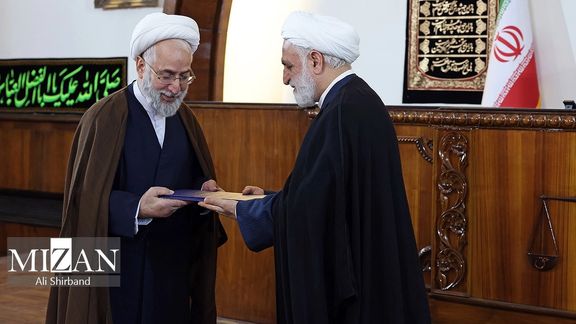
Iran's Chief Justice Gholamreza Mohseni-Ejei has appointed another cleric and a former court of appeals judge accused of human rights violations as prosecutor general.
The 62-year-old Qom-born Mohammad Movahedi-Azad, like most other Iranian judges, has seminary education and clerical background and his task is to enforce the country’s Sharia-based laws.
Movahedi-Azad’s predecessor, Mohammad-Jafar Montazeri who had held the post since April 2016, was sanctioned by the United States last December for his role in “overseeing the prosecution of protesters” during mass demonstrations last year. Britain also sanctioned Montazeri in January in reaction to the execution of Alireza Akbari, a former Iranian official, on charges of spying for Britain.
Montazeri has now been appointed as the head of the Supreme Court of Justice.

The newly appointed prosecutor-general began his career in the judiciary at the Tehran Province Prosecutor's office at the age of 24, right after the Islamic Republic was established in the early 1980s, and gradually rose to serve as the head of Branch 54 of Tehran Court of Appeal from 2009 to 2015. Since then, Movahedi-Azad has also served as special prosecutor for the clergy, head of the Tehran Revolutionary Court, and head of the Disciplinary Court for Judges.
During his tenure as an appeals judge, Movahedi-Azad was responsible for upholding the harsh sentences passed on many political prisoners convicted by Revolutionary Courts for their role in the 2009 protests that followed a disputed presidential election and other prisoners of conscience.
Movahedi-Azadi is responsible for re-imposing twenty-year prison sentences for seven former administrators of the Iranian Baha’i community in 2011.
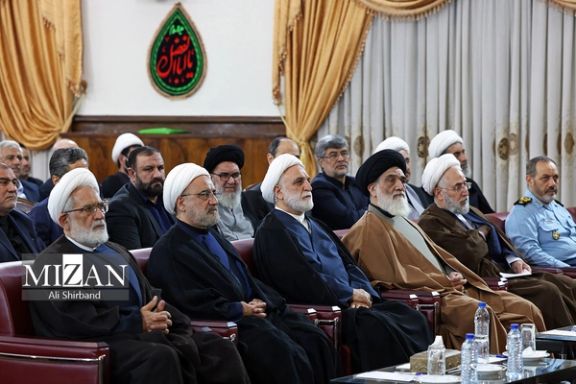
The seven Baha’i leaders were accused of espionage, propaganda against the regime and forming an illegal organization [to administer their community], without due process of law. Nevertheless, their sentences were reduced from 20 to 10 years by an appeals court, only for the authorities to reverse the decision.
Justice for Iran, a London-based human rights NGO, which defines its mission as holding perpetrators of serious human rights violations in Iran to account, in 2018 listed Movahedi-Azad as a human rights violator for the upholding the sentences passed on Baha’i citizens.
“Upholding heavy sentences for Baha’is, merely on account of their religious beliefs, and prison sentences for those who protested 2009 elections, lawyers and civil and political activists are some of the instances of Mohammad Movahedi-Azad’s human rights violations,” Justice for Iran said.
At the time, following the lead of Supreme Leader Ali Khamenei, Movahedi-Azadi labelled “protesters” as “rioters” and said the court of appeals had a “very impressive” role in ending the alleged riots.
Beside the Baha’i leaders, Movahedi-Azad upheld heavy sentences for other Baha’i citizens, such as Faran Hesami and her husband Kamran Rahimian, who had been put on trial just for teaching other Baha’is at the Baha’i Online University, because followers of the faith are not allowed to study in public or private Iranian universities.
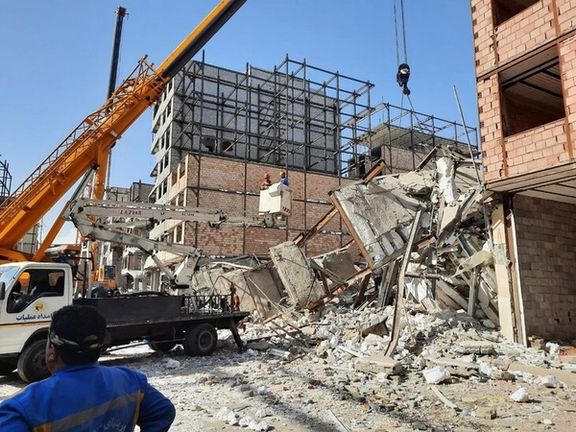
Five buildings that were under construction have collapsed in southern Tehran, killing at least three people and injuring more than 10 others.
Tehran's Firefighting Organization said Sunday that four police officers and two municipality employees as well as a few other people had been trapped under the rubble.
Three dead bodies, including Major Hossein Esmaili and Colonel Yazdan Soleimanabadi, have been recovered from the debris. The third victim, an elderly man, has not been identified yet while rescue operations are still underway at the site. At least two other people are still trapped.
The two police officers had been overseeing the legally-ordered demolition of a building, when five buildings nearby collapsed, and they were killed under the rubble.
There are at least hundreds of high-risk buildings in Tehran, but authorities refrain from officially announcing the list saying it "would worry the people". However, a list of 129 unsafe buildings was published by Ensaf News last year. IRNA state news agency reported last June that there are currently "33,000 unsafe buildings" in Tehran.
The Plasco Building was a 20-story high-rise that collapsed on January 19, 2017 after it caught fire. Twenty firefighters were reportedly killed and at least 70 others were injured by the collapse.
The problem is not limited to the capital. Last year in May, a 10-storey building in the southern city of Abadan collapsed, burying more than 80 people under the rubble, with 42 bodies recovered, an incident described by pundits as “a miniature symbol of the dynamics prevailing in Iran's government."
Soon after the collapse it became apparent that the owner and builder, Hossein Abdolbaghi, was a well-connected businessman who had disregarded regulations and building codes, backed by officials, who might have had their own financial interests.
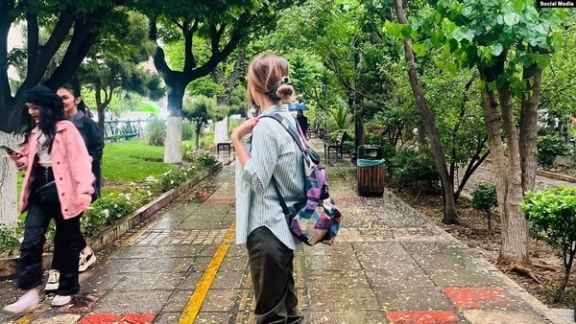
The municipality of Tehran plans to dispatch 400 of its personnel as hijab enforcers to subway stations of the capital.
Faraz Internet Daily reported on Sunday that the roles of these new hijab enforcers include warning women against removing the mandatory headscarves, preventing their entry without "proper" attire, and handing them over to law enforcement authorities if they disregard the rules.
The daily said these enforcers, who have been trained by Tehran Municipality Security Unit, will receive a monthly salary of 120 million rials (about $240), almost twice as much as the minimum wage in Iran.
According to the report, Tehran Municipality has earmarked a $100,000 monthly budget for hijab enforcement at subways stations.
The capital’s metro stations have been a hijab battleground since the municipality formed a special uniformed security unit to stop unveiled women from passing through the ticket gates earlier in the year.
The uprising that was sparked by the death in police custody of Mahsa Amini in September 2022 has made it increasingly difficult for the clerical regime to enforce the mandatory Islamic dress code. Since the beginning of the ‘Women, Life, Liberty’ movement, tens of thousands of girls and women have shed their compulsory hijab.
To avoid the public backlash over the violent enforcement of hijab laws, the Islamic Republic has recently begun implementing a wide range of measures from public humiliation tactics to using traffic cameras to identify women without hijab.
Moreover, heated debates over a new bill about how to deal with women who refuse to observe compulsory hijab continues inside and outside the Iranian parliament. The bill mainly relies on cash fines to force women to wear the hijab.